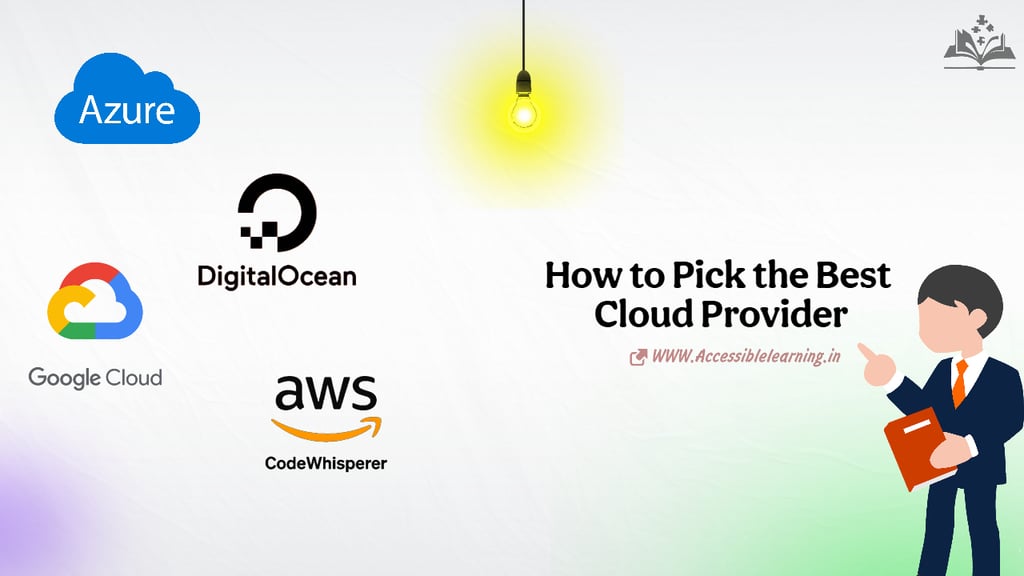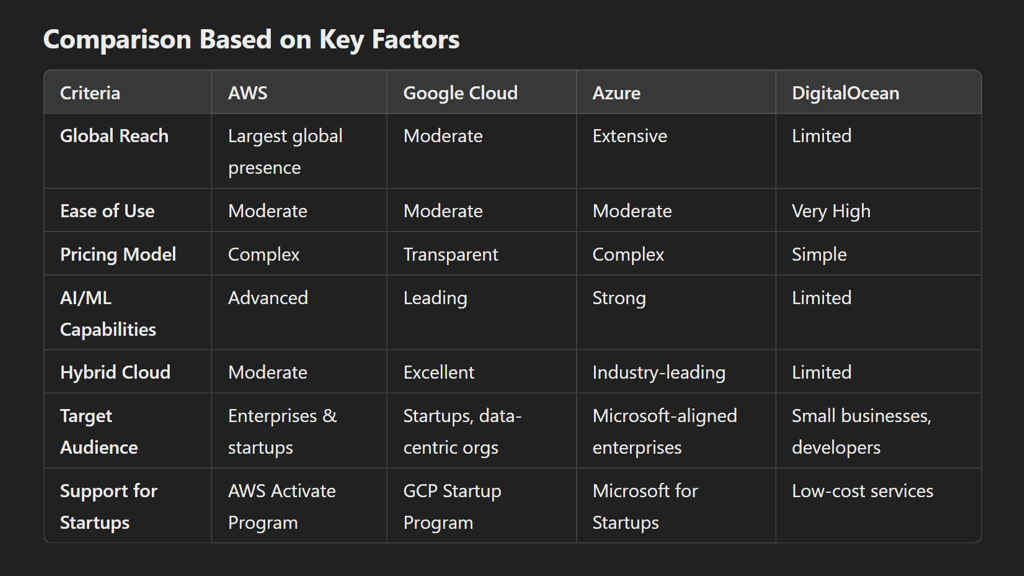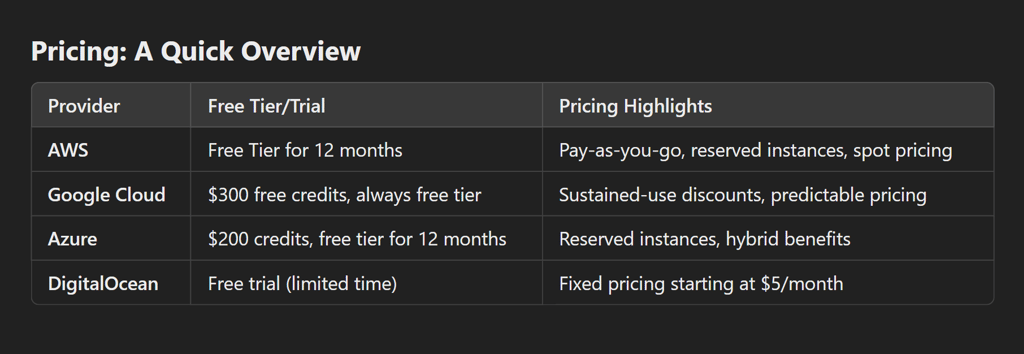
Choosing the Right Cloud Platform: AWS, Google Cloud, Azure, or DigitalOcean?
Explore the ultimate comparison of AWS, Google Cloud, Azure, and DigitalOcean. This in-depth guide dives into their key features, pricing models, performance benchmarks, compliance standards, and ideal use cases. Find the perfect cloud platform for your business needs, whether you’re a startup, an enterprise, or a developer.
EDITOR/TOOLSPROGRAMMINGDIGITAL MARKETINGCOMPANY/INDUSTRYAI/FUTURE
Sachin K Chaurasiya
12/19/20248 min read


Cloud computing has become a cornerstone for modern businesses, powering everything from simple website hosting to complex AI-driven applications. Among the top players, Amazon Web Services (AWS), Google Cloud Platform (GCP), Microsoft Azure, and DigitalOcean dominate the market with their diverse offerings. However, each provider has its own unique strengths and trade-offs.
This article provides an in-depth comparison to help you navigate through their services, pricing, performance, and use cases, ensuring you make the right choice for your business needs.
Amazon Web Services (AWS)
AWS pioneered the cloud computing space and has maintained its position as the market leader. With its vast array of services and global presence, AWS has a solution for nearly every industry and workload type.
Strengths
Industry Leadership: AWS has been the go-to provider for enterprises, with clients including Netflix, Airbnb, and NASA.
Broadest Service Portfolio: AWS offers unmatched diversity with services like advanced data warehousing (Redshift), AI/ML (SageMaker), IoT (Greengrass), and media streaming.
Global Availability Zones: With over 100 availability zones and plans to expand, AWS ensures redundancy, high availability, and low latency.
Emerging Innovations
AWS continues to innovate in emerging fields such as quantum computing (Amazon Braket), edge computing (AWS Outposts), and 5G networking (Wavelength).
Developer Tools
AWS has a comprehensive suite of tools for developers, including the AWS Developer Toolkit, CloudFormation for infrastructure as code (IaC), and integrations with CI/CD pipelines.
Customer Support
While robust, AWS support is tiered, meaning high-quality support can be costly for small businesses.
Ecosystem Development & Third-Party Integrations!
AWS has an incredibly mature ecosystem with integrations across thousands of third-party applications and SaaS platforms. It also has a thriving marketplace where customers can quickly deploy pre-configured applications or custom software.
Notable Add-ons: AWS Lambda (serverless computing), CloudTrail (logging and monitoring), and Elastic Beanstalk (application deployment).
Partners: AWS has an extensive partner network, including consultancies like Accenture and Deloitte, ensuring global support for enterprise-level customers.
Industry Adoption and Use Cases
Media and Entertainment: Netflix and Disney+ use AWS for streaming.
Retail and E-commerce: Amazon.com runs on AWS, as do platforms like Etsy.
Healthcare: Companies like Johnson & Johnson and Moderna leverage AWS for large-scale data analysis and genomics.
Performance Benchmarks
Industry leader in IOPS (Input/Output Operations Per Second) and latency for large-scale applications.
Outperforms in data-heavy operations, especially with Amazon EBS (Elastic Block Store).
Data Privacy and Compliance
AWS boasts over 90 compliance certifications globally, including GDPR, HIPAA, and FedRAMP. Its vast security features and tools like Macie (data security) and GuardDuty (threat detection) make it a leader in compliance.
Future Trends and Roadmap
AWS is doubling down on quantum computing (via Amazon Braket), AI-powered DevOps (CodeGuru), and sustainability with carbon-neutral data centers.
Growth will focus on edge computing and industry-specific services, such as financial analytics.
Advanced Pricing and Billing Insights
While AWS offers multiple cost-saving plans (like Reserved Instances and Savings Plans), unexpected costs for data egress can be a concern.
Spot instances allow companies to bid on unused capacity for substantial savings.




Google Cloud Platform (GCP)
Google Cloud leverages its parent company’s innovation in AI and infrastructure to stand out as a forward-thinking cloud platform. It appeals particularly to companies prioritizing AI/ML, big data analytics, and containerized workloads.
Strengths
Cutting-Edge AI/ML: Google’s TensorFlow and Vertex AI are industry-standard tools for building and deploying machine learning models.
Big Data Powerhouse: BigQuery offers unparalleled capabilities for handling petabyte-scale data analytics.
Sustainability Leadership: GCP is known for being one of the most sustainable cloud platforms, running on 100% renewable energy and offering tools to help clients measure their carbon footprint.
Hybrid and Multi-Cloud Flexibility: Anthos supports workloads across AWS, Azure, and on-premise systems, offering flexibility unmatched by competitors.
Emerging Innovations
GCP is heavily investing in serverless computing (Cloud Run), edge AI, and blockchain solutions, making it a strong choice for future-forward companies.
Challenges in Adoption
Although GCP’s innovative tools are cutting-edge, its market share remains smaller, and its ecosystem isn’t as mature as AWS or Azure, which may result in fewer third-party integrations.
Ecosystem Development & Third-Party Integrations!
GCP benefits significantly from Google’s existing ecosystem, such as integrations with Android, Google Workspace (formerly G Suite), and Firebase (a popular backend platform for mobile developers).
Unique Value: Superior support for open-source tools like Kubernetes (which Google invented) and TensorFlow.
Marketplace Strength: Smaller than AWS but gaining traction with industry-specific solutions like retail analytics and media streaming.
Industry Adoption and Use Cases
Technology and Startups: Snapchat and Spotify rely on GCP for scalability.
Gaming: Unity and Activision Blizzard uses GCP for real-time analytics and multiplayer hosting.
Public Sector: GCP is used by governments for carbon neutrality initiatives.
Performance Benchmarks
Excels in machine learning workloads and query performance using BigQuery.
Its premium network tier reduces latency by routing traffic through private, low-congestion paths.
Data Privacy and Compliance
GCP’s sustainability credentials and data security initiatives align well with industries like healthcare and finance. Its Zero Trust Security Model ensures secure identity verification and access control.
Future Trends and Roadmap
GCP aims to integrate more AI into its services while focusing on multi-cloud compatibility. The Anthos platform is a clear investment in this direction, enabling seamless workflows across diverse platforms.
Advanced Pricing and Billing Insights
GCP’s Sustained Use Discounts automatically lower costs for workloads that run consistently over a month.
Additionally, Committed Use Discounts let customers reserve resources in advance for up to 57% savings.


Microsoft Azure
Azure’s strength lies in its seamless integration with Microsoft’s existing enterprise tools, making it the natural choice for businesses already using Office 365, Dynamics 365, or Windows Server. Azure has also become a leader in hybrid cloud solutions, enabling companies to bridge on-premises infrastructure with cloud-based services.
Strengths
Hybrid and Edge Solutions: Azure’s hybrid offerings (like Azure Stack and Azure Arc) are industry-leading, allowing businesses to build and run hybrid apps consistently.
AI Democratization: Tools like Cognitive Services and Bot Services make AI accessible even to developers with limited expertise.
Comprehensive IoT Services: Azure IoT Hub and IoT Central provide excellent tools for IoT application development and management.
Microsoft Integration: For companies heavily reliant on Microsoft tools, Azure offers unparalleled ease of integration, saving time and reducing complexity.
Security
Azure invests heavily in security with tools like Azure Sentinel, a cloud-native SIEM (Security Information and Event Management), and Azure Security Center for threat management and compliance.
Market Penetration
Azure has been rapidly growing in market share, particularly among government agencies and large enterprises, thanks to its robust compliance offerings.
Ecosystem Development & Third-Party Integrations!
Microsoft Azure seamlessly integrates with Microsoft 365, Dynamics 365, and even SAP. Its native support for SQL Server and enterprise databases gives it an edge for companies already invested in Microsoft technologies.
Partner Ecosystem: Azure’s partnerships with enterprise software providers and its rich developer tools (like Visual Studio) make it a favorite in the developer community.
Azure Marketplace: Offers over 17,000 certified applications and services for specific industries.
Industry Adoption and Use Cases
Government and Defense: The US Department of Defense uses Azure for its JEDI contract.
Financial Services: Firms like HSBC and J.P. Morgan Chase use Azure for their hybrid cloud needs.
Education: Universities adopt Azure for remote learning environments and research labs.
Performance Benchmarks
Performs consistently well in hybrid environments, especially for companies using on-premise infrastructure.
Noted for smooth integration of IoT and edge applications.
Data Privacy and Compliance
Azure leads in compliance for government, healthcare, and finance industries, offering services certified by FedRAMP High, ISO 27001, and GDPR. It also supports highly regulated markets like energy and telecommunications.
Future Trends and Roadmap
Azure’s roadmap emphasizes hybrid solutions, 5G adoption, and tools for digital transformation in industries like manufacturing and retail. Its focus on confidential computing adds an extra layer of security for sensitive data.
Advanced Pricing and Billing Insights
Azure’s Hybrid Benefit allows customers to use their existing Windows Server and SQL Server licenses for additional savings.
Offers reserved VM instances for predictable workloads at reduced prices.


DigitalOcean
While AWS, Azure, and GCP dominate the enterprise market, DigitalOcean is the champion of small businesses, startups, and independent developers. It focuses on simplicity, transparency, and affordability without overwhelming users with a vast array of features.
Strengths
Ease of Use: DigitalOcean is designed with simplicity in mind, allowing developers to deploy applications in minutes with user-friendly dashboards and one-click installations.
Transparent Pricing: Fixed pricing makes it easy for small businesses to predict costs. Unlike AWS or Azure, there are no hidden fees or complex billing structures.
Community Resources: DigitalOcean’s tutorials and developer forums are unmatched, making it an excellent choice for beginners.
Developer-Oriented Features
DigitalOcean specializes in offering services like Droplets (virtual machines), App Platform for serverless deployment, and managed databases for MySQL, PostgreSQL, and Redis.
Challenges
Lack of advanced features like AI/ML tools or comprehensive hybrid cloud capabilities.
Limited scalability for enterprises needing global infrastructure or extensive compliance certifications.
Ecosystem Development & Third-Party Integrations!
DigitalOcean's ecosystem focuses more on developers, startups, and SMBs. Its integration options, though smaller in scope, are straightforward and efficient.
Focus Area: One-click deployment options for applications like WordPress, LAMP stacks, and Docker containers.
Industry Adoption and Use Cases
Startups: Small companies often use DigitalOcean for cost-effective web hosting or app testing environments.
Developers: With its simple dashboard, it’s often a preferred choice for freelance developers.
Performance Benchmarks
Offers impressive performance for smaller workloads with SSD-based virtual machines (Droplets).
However, it may lag behind AWS or GCP in handling large, complex datasets.
Data Privacy and Compliance
While it does meet GDPR requirements, DigitalOcean's compliance offerings are not as extensive as the other three providers. It's ideal for non-regulated industries or smaller projects.
Future Trends and Roadmap
DigitalOcean is expanding its Kubernetes offerings and launching new tools for simplifying CI/CD workflows for startups. Its growth is centered on empowering developers through simplicity.
Advanced Pricing and Billing Insights
Fixed pricing makes it appealing for startups and developers, avoiding surprise bills. For example, $5/month for a basic Droplet is straightforward compared to competitors.
No hidden fees for data transfer within the same region.




Final Recommendations!
Enterprise-Grade Applications: Choose AWS for scalability and diversity.
AI/ML and Big Data: Google Cloud remains unmatched in innovation.
Hybrid or On-Premise Integration: Opt for Azure for seamless connections with existing systems.
Small Businesses or Developers: DigitalOcean is perfect for simplicity and cost efficiency.


AWS is ideal for large-scale enterprises and organizations requiring a robust, scalable, and feature-rich platform.
Google Cloud appeals to data-centric companies and those leveraging AI/ML technologies.
Azure is the top choice for Microsoft-aligned enterprises or those seeking hybrid cloud solutions.
DigitalOcean is perfect for developers, startups, and small businesses prioritizing simplicity and affordability.
Carefully assess your project’s requirements, budget, and technical expertise before making your decision. With the right provider, you can unlock unparalleled growth and efficiency for your business.
Subscribe To Our Newsletter
All © Copyright reserved by Accessible-Learning Hub
| Terms & Conditions
Knowledge is power. Learn with Us. 📚


